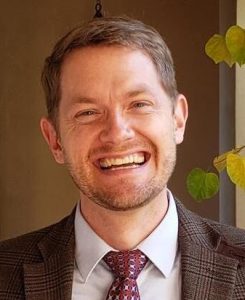This past Sunday was beautiful. After a wonderful worship service, many of us walked downtown for Williamsburg’s PrideCon, an annual event put on by Love is Love Tidewater. It was a welcoming environment where people felt safe and free to be themselves. We laughed and talked while enjoying the festivities and food trucks.
I was invited to speak about our commitment to welcoming LGBTQ persons as full participants in the life of our church. I shared our deeply rooted belief that God loves and embraces all people. People clapped. I offered words of gratitude for our partnership with the event’s hosts. It was a good day.

Arthur Wright Jr.
As the event began to wind down, I walked to my favorite coffee shop and took my place at the back of a long line winding its way around the display case of delightful-looking baked treats.
Seconds later, a young woman with a baby on her hip approached.
“Excuse me, are you a pastor?”
Remembering that I was wearing my rainbow-colored “This Pastor Loves You” T-shirt, I responded “I am.”
“Oh, OK. I’m a Christian missionary, and I’m wondering if you’ve read these particular verses before.”
I braced myself, knowing for certain what I was in for, as she began to read 1 Corinthians 6:9-10 from her phone, verses commonly used to condemn LGBTQ people.
I tried to cut her off, assuring her that I had, in fact read those verses. Many times, in fact. And that I had even read them in Greek, and that I didn’t think hers was a very good translation of those particular verses.
Unimpressed, she began verbally berating me for the next 10 minutes as the line progressed its way in excruciatingly slow fashion to the register.
I turned away and shook my head in disbelief that this was happening — loudly — in a crowded coffee shop.
I explained that I have a Ph.D. in biblical studies and that I have studied these verses and the other so-called “clobber passages” exhaustively, all in their original languages, seeking to understand what they meant in antiquity and how we should interpret them today. That I have read thousands of pages of scholarship on these verses and that my personal conclusion is that the God of the Bible is a God of love who welcomes people from the margins to the center. And that it’s always the “religious experts” of Scripture — the ones who think they have it all figured out — who bear the brunt of Jesus’ criticism time and time again.
“She explained the need to call me to a higher standard because I’m a pastor and said she feared I would burn in hell for all eternity.”
She heard none of it. She explained the need to call me to a higher standard because I’m a pastor and said she feared I would burn in hell for all eternity.
I replied, “Ma’am, I’ll be honest. I just want to get a cup of coffee so I can go home to see my kids.”
She recoiled. “You have … kids?” As if I must also be leading them into an afterlife of eternal damnation.
She rebuked me for leading my congregation astray. She mentioned Genesis 19 and the story of Sodom and Gomorrah. (“Yes, I’ve read that before, too.”) She asked me why God destroyed those cities, to which I explained, “Jesus himself only ever mentioned a failure of hospitality, not sexual sin, when lamenting the destruction of those two cities.”
She insisted I had fallen from “the straight and narrow path” and was on the “wide road” to damnation. That I had taken the “easy path” and had capitulated to modern cultural values.
I responded that, ironically, I was in the vast minority of pastors who support love and full inclusion of LGBTQ persons, and so perhaps I was actually on the narrow and difficult path. (After all, I was the one getting harassed in a coffee shop. Not her.)
It was futile. I conceded: “It seems clear to me that we do not see eye-to-eye on this, so can you please just let me get my cup of coffee in peace?”
Undeterred, she was about to continue her haranguing, when a quiet young woman in front of us turned around.
“Hi, I couldn’t help but overhear your entire conversation, and I’m wondering if I can buy you a cup of coffee.” Her voice was deeply empathetic as she spoke to me, no doubt seeing the look of frustration on my face.
I said yes, I’d be very grateful, and simply wanted a small black coffee. She turned and ordered two coffees while the “Christian missionary” resumed her attack.
When it became clear I was about to get my cup of coffee and leave, my antagonist fired off a couple of final comments about promising to pray for me and then walked away frowning, still bouncing her baby on her hip.
“The kind woman in front of me handed me a cup of coffee and introduced herself as a local graduate student.”
The kind woman in front of me handed me a cup of coffee and introduced herself as a local graduate student, and we chatted for a few minutes about what had just happened. She commented that she couldn’t believe I had responded so well to the verbal lashing I had received.
“Thanks for shining your light,” I told her, my voice shaking with emotion. “It makes a difference. Keep it up.”
We said goodbye and I headed home.
To echo Jesus, which one of these was a neighbor to the pastor in the coffee shop?
The difference was stark to me: In the “Christian missionary,” I felt nothing loving or kind in her prideful insistence that she had all the right answers and that mine was an unfortunate and a damnable fate. At the same time, I couldn’t help but see the light of Christ shining brightly through the graduate student in her quiet act of mercy. I have no idea if she is religious in any way, but she did infinitely more in her act of kindness to spread divine love and light and goodness in this world.
May we all go and do likewise.
Arthur M. Wright Jr. is senior pastor of Williamsburg Baptist Church in historic Williamsburg, Va. He previously served as associate professor of spirituality and New Testament at Baptist Theological Seminary at Richmond and as theologian in residence for the Cooperative Baptist Fellowship of Virginia. He holds a Ph.D. in biblical studies from Union Presbyterian Seminary in Richmond.


